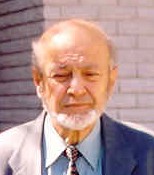
Adib Marabani |
Canterbury’s People: Adib Marabani is a highly respected leader in the Lebanese Muslim community in Canterbury. He played a major part in the establishment of Ali Ben Ali Mosque and the Lebanese Muslim Association at Lakemba.
Life in Lebanon
Born in 1928, Adib Marabani grew up in Tripoli, Lebanon. Adib’s father ran a business as an agent for growers selling produce in the local markets. His brother and sister still live in Lebanon.
As a child, Adib took great pride in learning and remembers being “a very good student at school”. It was his plan to go on to University to study medicine. During Adib’s early teenage years, his father became sick with a prolonged illness and as a consequence, the family could not continue to finance his education. His great ambition of becoming a doctor was unfulfilled.
On leaving school Adib took a job as a clerk, but being an ambitious young man, he found it difficult to stay in Lebanon working and watching his other friends go overseas to study. So, at the age of 22 years he decided to come to Australia.
“I wanted to better myself. I wanted to study and work to become a doctor. I didn’t become one, but my daughter is now [a] doctor.”
Arriving in Australia
At sunset on the 5th January 1951, Adib and a friend arrived at Circular Quay. From the deck of their ship they took their first view of Sydney. The captain gave permission for the passengers to stay overnight on the ship and late that afternoon the men went for their first stroll along George Street in the city.
“We were looking for a restaurant, but couldn’t find anywhere to eat…we didn’t realise that milk bars sold food. So instead, we bought a block of chocolate and went back to the ship.”
The next day Adib and his friend collected their luggage and found a room to rent in Randwick. They stayed there for a short period before moving to Kensington.
Work was plentiful in 1951 and Adib soon secured work at a factory at Zetland. Being highly motivated to succeed in his life in Australia, Adib learned English quickly. Over the next two years he was promoted through the ranks of workers to become a leading hand. He worked very hard and often went to work on Sundays to prepare himself for the start of the working week.
Settling in Sydney
With a secure job and a place to live, Adib began to feel more settled. Like many men of his age he felt the desire to start a family, so wrote to his mother in Lebanon asking her to find a bride for him. He was delighted when she suggested his cousin Hiam who he knew very well. She agreed to join him and in 1957 they began their life together in Australia.
Shortly after they were married, Adib bought a house on Punchbowl Road. He had managed to save the deposit for the house in his first six years of working in Australia.
“The house cost 3,200 pounds. I had to take a first and second mortgage, and twelve months after paid the second mortgage off.”
Life was going well and in 1962, the Marabanis’ bought and opened a ‘mixed business’ shop in Lakemba. His wife managed the shop for about ten years while Adib continued working in the factory for another two years.
He then went on to supervise the building of eight units on a block of land he had bought in Roselands when the house in Punchbowl was sold. From the profits of the units, they bought a house in Earlwood.
Adib and his wife have raised two children. They were educated at Belmore North and Earlwood Primary Schools and their daughter attended North Kingsgrove High School and their son a private school. Adib and his wife have worked very hard over those years, particularly when their children were young.
“My wife worked very hard, she had to look after our two children and the shop at the same time.”
The Lakemba Mosque
The Mosque has always played an integral role in Adib’s life and that of many other Muslim people who have come to Australia. Adib has been a key player in the development of the Lakemba Mosque and has worked as a volunteer there for many years.
The Lebanese Muslim community in Sydney grew rapidly after the civil war began in Lebanon in 1976. At the time, the community gathered in private houses to pray and it was not long before they needed a larger house of worship. With a $300,000 donation from Saudi Arabia, building work started in 1976.
The Lebanese Muslim Association helped raise the other $450,000 needed to complete the works by approaching the community. Finally at the end of 1977 the Mosque was operational. At this stage it was not furnished or carpeted, but after the Ambassador of Libya visited the Mosque, he donated enough money to have the whole space carpeted.
The Lakemba Mosque continues to be a central focus for the Muslim community.
“Muslim people need to pray on Friday and don’t want to travel too far. This is one of the reasons why every second or third house in Lakemba is Arabic, they want to be close to the Mosque.”
The Lebanese Muslim Association
Adib has seen a great growth in numbers of Arabic people in the Canterbury area since first moving there in 1957, and in particular after the civil war in Lebanon.
“It wasn’t like that before when there were just a few people coming every now and then. The old settlers could not cope with the great numbers. Every Lebanese family took people in until they could find jobs and places to live. Many of them were penniless and some of the young people couldn’t fit into school because the education system was very different from Lebanon.”
Adib has worked for quite a number of years for the Lebanese Muslim Association. Founded in 1961, the Association has provided valuable support to the Muslim community over the years.
“The Association ran from the Mosque and acted like an agency…early in the morning we would go through the [Sydney Morning] Herald and say for instance, someone needed a carpenter in Bankstown, the volunteers would drive the person to the job and explain that their English was not good, but they were good workers. We also assisted with child endowment payments and sometimes got calls at night time if someone’s child was sick and we took them to the hospital. We helped so many people. Then things got better slowly around the 1980s and the migration had slowed down.”
The Lebanese Muslim Association had bought a parcel of land with an old cottage on it in 1959 and for many years the community used the house and the facilities there for meetings, teaching Arabic to children and many happy social gatherings.
“Sometimes on Saturday we had 20-30 families getting together. It wasn’t just about religion, but about getting together to talk and socialise. We had a marvellous time and the children were playing together happily.”
The new Lakemba Mosque was built on this land. Now located across the road from the Mosque, the Lebanese Muslim Association is better equipped to assist people.
Living in Canterbury
There have also been great changes in the shops, business and products that people can buy in the area. When Adib first arrived in the area, most of the proprietors that had shops or business in Lakemba only spoke English, whereas now “every second shop speaks Arabic”.
“There wasn’t any of the variety of foods we wanted to buy. The only place we could buy olive oil for cooking was in the chemist shop. They sold small bottles of it for people to use when sunbaking and it was so expensive. There were also only corner shops in those days and they didn’t sell eggplant, capsicum or grapes. Things have changed so much due to the migration. Before you couldn’t even buy Arabic books, now there are half a dozen shops where you can buy these things.”
Adib has also witnessed a change in the Australian attitude towards migrants. He feels that Australians are more accepting of migrants now compared to when he first arrived in the 1950s and that Australia is truly a ‘multicultural society’.
Life today
Adib moved out of the Canterbury area in 2001. After spending over forty years in the area he realises his heart is still there. Both his children still live in the Canterbury area and Adib and his wife are considering moving back in the near future. He continues to work part time with the Lebanese Muslim Association and is still actively involved with the Mosque. He visits Lebanon every now and then but considers Australia as his home:
“Australia has given myself and my family many opportunities and Canterbury is very much my homeland.”
Adib would like to see Arabic people becoming better educated and has dreams of seeing many young Lebanese people in Parliament in his lifetime.

